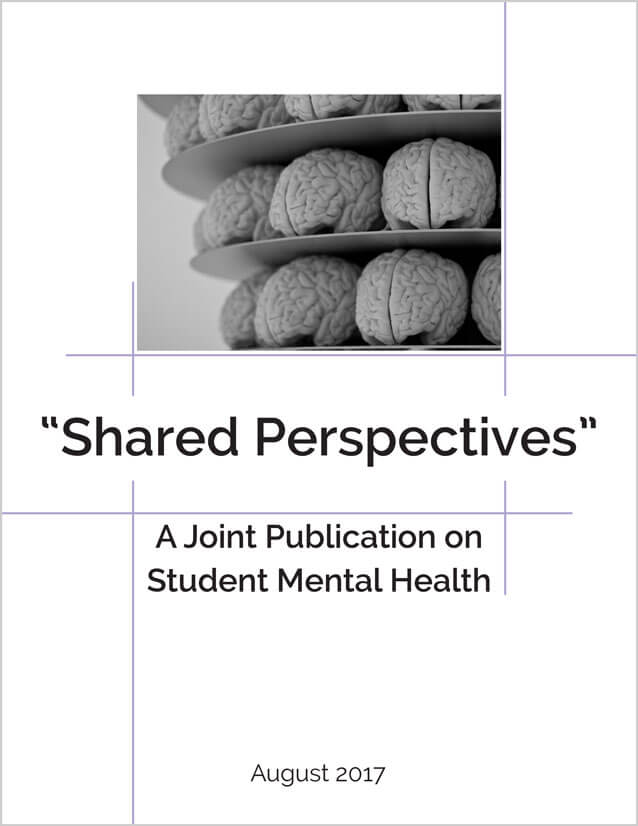Shared Perspectives
Shared Perspectives is a joint publication between Council of Alberta University Students, the Ontario Undergraduate Student Alliance, the New Brunswick Student Alliance, StudentsNS in Nova Scotia and the Canadian Alliance of Student Associations. It is the first time that all five organizations have formally collaborated, representing almost 300,000 postsecondary student voices through this publication. This paper looks at challenges and successes in postsecondary student mental health across the four provinces. The decision to work on the project comes in response to the recognition that a viable solutions will require a collective effort from student organizations and stakeholders across the country.
Alberta
Student advocacy groups, administrations, and governments, that stakeholders concerned about campus mental health have begun to share best practices and make an active case for postsecondary mental health funding in Alberta. In the autumn of 2016, the Government of Alberta struck an advisory panel on campus mental health to evaluate the current situation and what could be done to establish a long-term plan for a campus mental health strategy, including coordination with the provincial health care system and funding. In June 2017, the Government made good on its promise to place the mental health needs of post-secondary students front and centre, and released it’s seven steps to improving post-secondary mental health. Inspired by recommendations from the advisory panel, these steps included equitable funding for all Alberta’s publically funded post-secondary institutions that amounted to over $25 million for the next three years, integration of on campus mental health supports with the larger health care system, grants for indigenous campus mental health, a review of student aid policies in light of mental health needs, and funding for Healthy Campus Alberta – a grassroots community of practice which brings together stakeholders, including CAUS, involved in campus mental health to share knowledge and resources.
Ontario
Until recently, mental health promotion was lacking both on university campuses and throughout the broader Ontario communities. As such, a stigma evolved where many students and community members felt uncomfortable talking about the issues they faced and the challenges that their mental health posed in their day-to-day lives. However as the topic grew in public discourse, the Ontario government realized it needed to implement new systems, programs, and strategies to address this clear gap in healthcare using the Open Minds, Healthy Minds strategy. A critical part of the Open Minds strategy was the creation of the Mental Health Innovation Fund (MHIF). One of the most promising projects to emerge from the MHIF is the Centre for Innovation in Campus Health (CICMH). Part of the Centre’s success has to do with its timeliness. Its approach is very much in keeping with current perspectives on mental health provision and the attitudes surrounding it. Given its focus on students, resources, tools, and information, CICMH represents the natural next step of what has been more commonly observed and prioritized in mental health research in recent years.
New Brunswick
New Brunswick’s experience in dealing with mental health has seen the province’s educational institutions react with incredible speed. Today, as a result, mental health discussions are ubiquitous in our communities. Discouragingly though, mental health services on campuses continue to be underfunded or nonexistent despite the increased physiological stress factors directly related to the postsecondary experience. Consequently, students in New Brunswick 13 feel let down by a lack of institutional capacity of university mental health services to address their growing needs.The significant commitment by the Government of New Brunswick to expand accessibility to public postsecondary institutions through the Tuition Access Bursary indicates that the government could be serious about its investment in the province’s students.
Nova Scotia
Universities are spending a lot of money to address mental health, but it is argued that they are in fact addressing the wrong areas. This presents the largest challenge in Nova Scotia for addressing mental illness: rather than investing in unmet need, they are addressing 15 met “unneed.” The contributing factors to stress being perceived as mental illness are students lacking the skills to make a healthy transition into post-secondary education, such as time management, as well as the illusion that stress is always a bad thing.5 Additionally, universities are failing to address the systemic issues that they face. The government will need to make strategic, meaningful investments in student mental health to ensure that our youth are able to cope with stress and receive the assistance for mental health illness when it is needed. StudentsNS believes that student needs must be a focus for all parties important in student success: institutions, on-campus groups, community organization, and government. Student mental health continues to be a student need that is not being sufficiently supported. While some partnerships and collaborations, such as Pathway Through Mental Health Care for Post-Secondary Settings, have been formed to focus on a large-scale solution to the urgent call for more resources, it is not enough.


